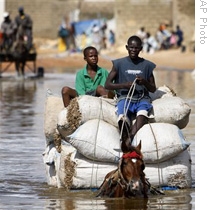Dakar
16 September 2009
 |
| Horse cart drivers transport goods and passengers through deep flood waters in Sicap Mbao, a neighborhood on the outskirts of Dakar, Senegal, 12 Sep 2009 |
More than half of those affected by this rainy season's flooding in West Africa are in Burkina Faso and Senegal. And most of them live in urban areas where poor drainage and unenforced zoning laws are compounding the problem.
Burkina Faso's heaviest rains in 90 years have made more than 150,000 people homeless. Most now live in schools and community centers around the capital, Ouagadougou.
Prime Minister Tertius Zongo is asking the international community for more than $150 million to drain that flood water and resettle thousands of families away from areas prone to flooding.
Elizabeth Byrs, of the U.N. Office for the Coordination of Humanitarian Affairs, says flooding has been made worse by poor urban planning.
She says flooding in downtown Ouagadougou is a consequence of what she calls "wild urbanism," a problem shared by the Senegalese capital, Dakar, where Byrs says unregulated construction in flood-prone areas blocks the natural flow of water.
When combined with drainage systems unable to keep pace with a growing urban population, Byrs says as little as five millimeters of rain can result in widespread flooding.
Sierra Leone's government blames illegal construction on protected land for floods and mudslides that killed seven people in the capital, Freetown.
Most of the nearly 250,000 people affected in Senegal live in low-lying neighborhoods outside the capital where the water table is so high and drainage so poor that water from last year's rains was still standing in some homes before this year's rains began.
In response to flooding in 2005, the Senegalese government started resettling families in a higher, drier area 25 kilometers east of the capital. More than 1,700 families now live in the settlement that has its own police station, primary schools, and a technical college with plans for another 1,300 homes.
Byrs says more changes must be made in the near future to reduce urban overcrowding in West Africa or each rainy season could produce more dramatic floods.